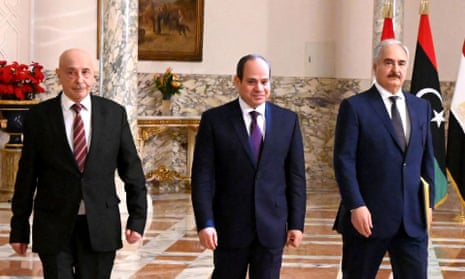Egypt’s president has announced an initiative to end nearly a decade of civil war in Libya, backed by the main commander in the oil-rich country’s east, whose siege of the capital, Tripoli collapsed this week.
President Abdel Fatah al-Sisi said a ceasefire will start on Monday and is meant to pave the way for elections. He called for peace talks in Geneva and the exit of all foreign fighters from Libya.
“There can be no stability in Libya unless peaceful means to end the crisis are found, that include the unity and integrity of the national institutions,” he told a news conference.
Beside him stood renegade general Khalifa Haftar, whose forces on Thursday began retreating from Tripoli toward his heartlands in the south and the east of the country.
Libya slid into civil war following the overthrow and killing of the country’s longtime dictator Muammar Gaddafi in 2011. For more than five years it has had rival parliaments and governments in the east and west.
The plan envisages an elected presidential council, with representatives from Libya’s three regions, ruling for an 18-month transition period until elections are held. It prescribes the unification of all financial and oil institutions, and the disbanding of militias to give state forces a monopoly over power, said Sisi.
Aguila Saleh, speaker of the country’s Tobruk-based House of Representatives also stood with Sisi, while foreign diplomats including US, Russian, French and Italian envoys attended.
However, there were no representatives of the UN-recognised government of national accord (GNA) based in Tripoli, or its main backers, Turkey and Qatar.
Although that administration did not immediately comment, a spokesman for military forces allied with it said they would continue fighting to recapture the city of Sirte from Haftar’s forces, who had seized it in January.
After the siege of the capital broke this week, interior minister Fathi Bashagha had hailed “the beginning of the end of the entire dictatorship project”, and urged cities under Haftar’s control to rise up against him and spare themselves further conflict.
Western powers are urging forces loyal to the GNA not to exploit its new military advantage by pushing deep into the east but instead to allow peace talks to resume with the aim of creating a new government of national unity.
Multiple previous attempts to establish truces and a return to negotiations have foundered, though the United Nations has started holding separate talks with both sides for a ceasefire deal in recent days.
